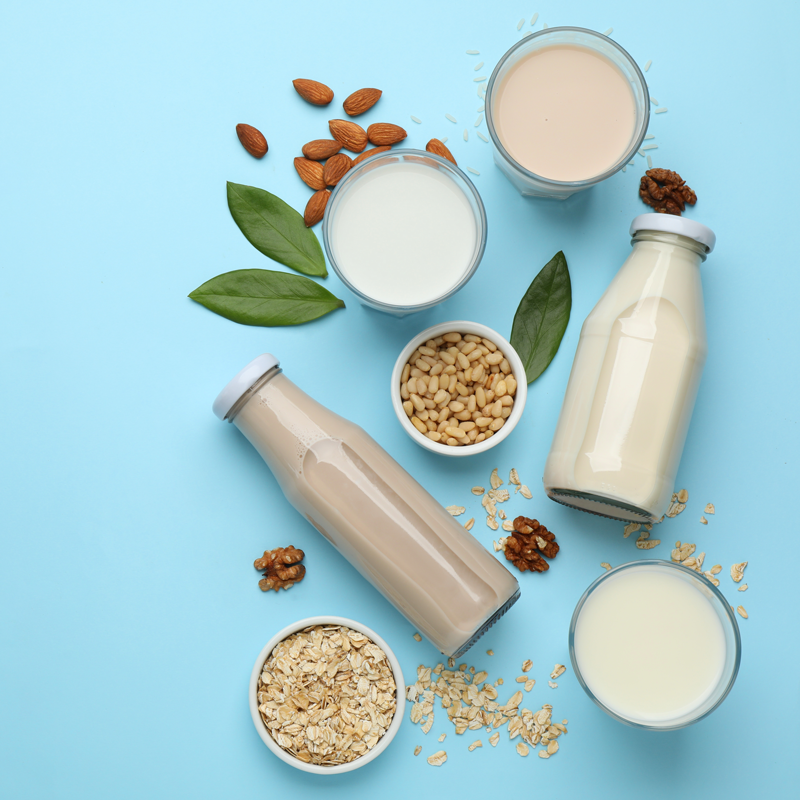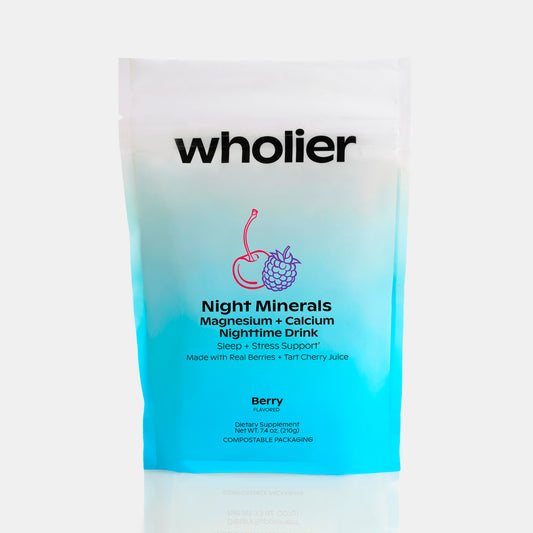
From Tofu to Seaweed: A Guide to Vegan Calcium Sources
Learn about the top vegan-friendly sources of calcium to ensure you're meeting your daily recommended intake of this essential mineral.
Calcium is an essential mineral that plays a crucial role in the development and maintenance of strong bones and teeth, muscle function, nerve transmission, and blood clotting (1). While dairy products are often considered the primary source of calcium, vegans and vegetarians can obtain adequate amounts of calcium from a variety of plant-based foods.
In this article, we'll explore what calcium is, why it's important, and the best vegan sources of calcium to help ensure you're meeting your daily recommended intake. We'll also discuss why calcium and calcium supplementation are specifically important for vegans and vegetarians.
What is Calcium?
Calcium is a mineral that the body needs to function properly. It's the most abundant mineral in the body, with 99% of the body's calcium stored in bones and teeth (2). The remaining 1% is found in blood, muscle, and other tissues and is essential for the proper function of various bodily processes.
Calcium is necessary for bone and teeth health, as it helps build and maintain strong bones and teeth. It's also important for muscle function, including the contraction and relaxation of muscles, and nerve transmission, which allows signals to travel throughout the nervous system. Additionally, calcium plays a role in blood clotting, helping to prevent excessive bleeding in the event of an injury (1).
Why is Calcium Important for Vegans and Vegetarians?
While calcium is essential for everyone, it's particularly important for vegans and vegetarians who exclude dairy products from their diets. Dairy products, such as milk, cheese, and yogurt, are some of the richest sources of calcium in the Western diet (3). However, there are many plant-based sources of calcium that can help vegans and vegetarians meet their daily calcium needs.
Calcium deficiency is a common concern for vegans and vegetarians, as many plant-based foods contain lower amounts of calcium than dairy products. However, studies have shown that vegans and vegetarians can meet their calcium needs through a well-planned, balanced diet that includes a variety of calcium-rich plant-based foods (4).
Calcium Supplementation for Vegans and Vegetarians
While it's possible to obtain adequate calcium from a plant-based diet, some vegans and vegetarians may choose to supplement their calcium intake to ensure they're meeting their daily recommended intake.
If you're looking to supplement your calcium intake, it's important to choose a supplement that's taken separately as a mineral or single nutrient supplement to ensure proper dosage (5). Calcium supplements should also be taken with meals to enhance absorption, and it's best to choose a supplement that's been tested for safety and efficacy by a third-party organization, such as USP or NSF International (6).
It's important to note that excessive calcium intake can lead to health problems, such as kidney stones and cardiovascular disease (7). Therefore, it's best to follow the recommended dosage guidelines for calcium supplements and avoid taking more than the recommended daily intake without consulting a healthcare professional.
Best Vegan Calcium Sources
Now that we've covered the basics of calcium and why it's important for vegans and vegetarians, let's take a look at the best vegan sources of calcium:
- Leafy Greens: Leafy greens, such as kale, collard greens, and spinach, are some of the best vegan sources of calcium. One cup of cooked kale, for example, contains 177 mg of calcium, which is about 18% of the daily recommended intake (8).
- Tofu: Tofu is a versatile plant-based protein that's also high in calcium. One half-cup serving of firm tofu contains around 250-300 mg of calcium (9).
- Almonds: Almonds are a great snack option that's also high in calcium. One ounce of almonds contains about 75 mg of calcium, which is about 8% of the daily recommended intake (10).
- Fortified Plant Milks: Many plant-based milks, such as soy milk, almond milk, and oat milk, are fortified with calcium. Check the nutrition label to determine the amount of calcium per serving, as it can vary by brand.
- Beans: Beans, such as black beans, navy beans, and chickpeas, are also a good source of calcium. One cup of cooked black beans, for example, contains about 50-55 mg of calcium (11).
- Chia Seeds: Chia seeds are a nutrient-dense food that's high in calcium, as well as fiber and omega-3 fatty acids. One tablespoon of chia seeds contains about 77 mg of calcium, which is about 8% of the daily recommended intake (12).
- Seaweed: Seaweed is a great source of calcium, as well as other important minerals like iodine. One sheet of nori seaweed, for example, contains about 60-70 mg of calcium (13).
Tips for Increasing Calcium Absorption
In addition to incorporating calcium-rich foods into your diet, there are also some tips you can follow to help increase calcium absorption:
Pair calcium-rich foods with vitamin D: Vitamin D is important for calcium absorption, so pairing calcium-rich foods with vitamin D-rich foods, such as mushrooms or fortified plant milks, can help increase absorption (14).
Choose calcium-fortified foods: Many plant-based foods, such as plant milks, cereals, and tofu, are fortified with calcium. Choosing these foods can help increase your calcium intake.
Avoid foods that inhibit calcium absorption: Certain foods, such as spinach and Swiss chard, contain compounds that can inhibit calcium absorption. It's best to avoid these foods or consume them in moderation (15).
Take calcium supplements with meals: Taking calcium supplements with meals can help enhance absorption (16).
Daily Calcium Intake Recommendations
The daily recommended intake of calcium varies depending on age, gender, and other factors. According to the National Institutes of Health, the daily recommended intake of calcium for adults between the ages of 19-50 is 1,000 mg per day, while adults over the age of 50 should aim for 1,200 mg per day (17). Pregnant and breastfeeding women may also require higher amounts of calcium.
Calcium is an important mineral that plays a crucial role in many bodily processes. While dairy products are often considered the primary source of calcium, vegans and vegetarians can obtain adequate amounts of calcium from a variety of plant-based foods. By incorporating calcium-rich plant-based foods into your diet and following tips for increasing calcium absorption, you can help ensure you're meeting your daily recommended intake of this essential mineral. If you're considering a calcium supplement, it's important to choose one that's tested for safety and efficacy and taken separately as a mineral or single nutrient supplement to ensure proper dosage.
Sources:
(1) National Institutes of Health. Calcium Fact Sheet for Consumers. https://ods.od.nih.gov/factsheets/Calcium-Consumer/
(2) Weaver, C. M., & Heaney, R. P. (2006). Calcium in human health. Totowa, NJ: Humana Press.
(3) Heaney, R. P. (1991). Dairy intake, dietary adequacy, and lactose intolerance. Advances in Experimental Medicine and Biology, 270, 61-70.
(4) Messina, V., & Messina, M. (2011). The role of soy in vegetarian diets. Nutrients, 3(8), 1020-1035.
(5) National Institutes of Health. Dietary Supplements: What You Need to Know. https://ods.od.nih.gov/HealthInformation/DS_WhatYouNeedToKnow.aspx
(6) National Institutes of Health. Calcium Fact Sheet for Health Professionals. https://ods.od.nih.gov/factsheets/Calcium-HealthProfessional/
(7) National Institutes of Health. Calcium Fact Sheet for Consumers. https://ods.od.nih.gov/factsheets/Calcium-Consumer/
(8) USDA FoodData Central. https://fdc.nal.usda.gov/
(9) National Institutes of Health. Calcium Fact Sheet for Consumers. https://ods.od.nih.gov/factsheets/Calcium-Consumer/
(10) USDA FoodData Central. https://fdc.nal.usda.gov/
(11) Ibid
(12) Ibid
(13) Ibid
(14) Weaver, C. M., & Plawecki, K. L. (1994). Dietary calcium: Adequacy of a vegetarian diet. The American Journal of Clinical Nutrition, 59(5), 1238S-1241S.
(15) National Institutes of Health. Calcium Fact Sheet for Consumers. https://ods.od.nih.gov/factsheets/Calcium-Consumer/
(16) National Institutes of Health. Calcium Fact Sheet for Consumers. https://ods.od.nih.gov/factsheets/Calcium-Consumer/
(17) National Institutes of Health. Calcium Fact Sheet for Consumers. https://ods.od.nih.gov/factsheets/Calcium-Consumer/ User Give the article a title ChatGPT Vegan Calcium Sources: A Comprehensive Guide for Plant-Based Eaters User Something more interesting ChatGPT From Tofu to Seaweed: A Delicious Guide to Vegan Calcium Sources User Write a one sentence excerpt ChatGPT Incorporating calcium-rich plant-based foods into your diet and following tips for increasing calcium absorption can help vegans and vegetarians meet their daily recommended intake of this essential mineral without relying on dairy products. User shorter ChatGPT Discover the best plant-based sources of calcium to help vegans and vegetarians meet their daily recommended intake of this essential mineral. User Do not use discover ChatGPT Learn about the top vegan-friendly sources of calcium to ensure you're meeting your daily recommended intake of this essential mineral. User Write a two sentence SEO description ChatGPT Looking for vegan sources of calcium? Check out our comprehensive guide to find out which plant-based foods are high in this essential mineral and how to incorporate them into your diet for optimal health. Don't miss out on meeting your daily recommended intake of calcium as a vegan or vegetarian.





